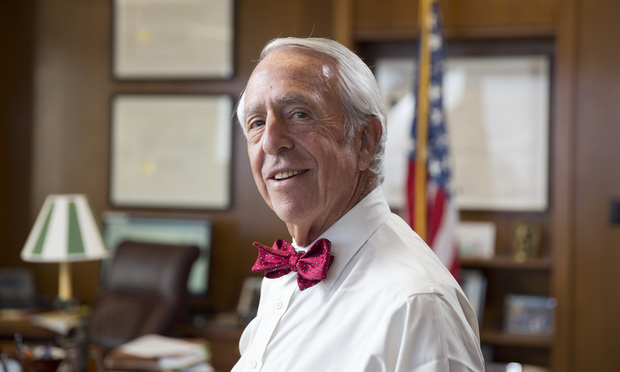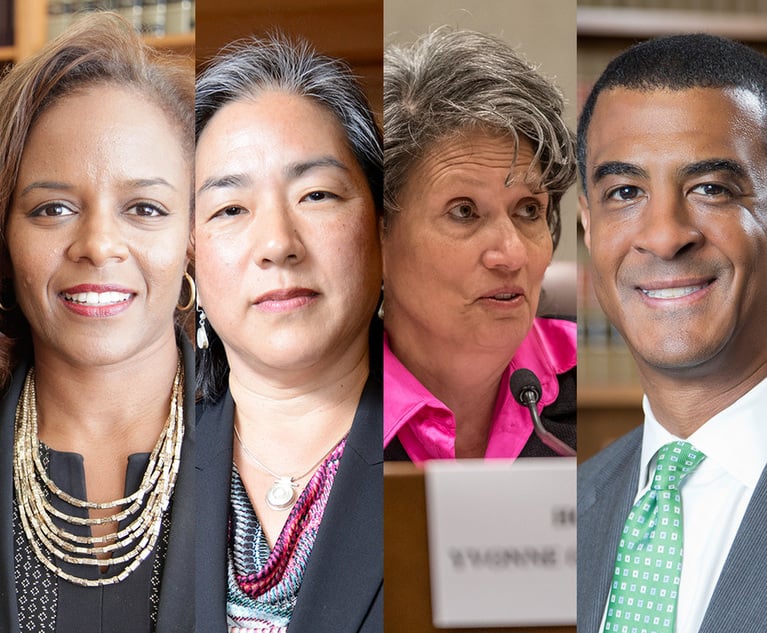'Inhumane' and 'Appallingly Cruel': Judge Criticizes Federal Prosecutor's Compassionate Release Waiver in Plea Agreement
"Why would federal prosecutors exercise the tremendous discretion entrusted to them with such a lack of compassion?" wrote U.S. District Judge Charles Breyer in rejecting a plea agreement that delayed when the defendant could ask for compassionate release. The region's top prosecutor said the Northern District of California U.S. attorney's office had changed its model plea agreement in a way that would allow such requests prior to the judge's order.
May 11, 2020 at 05:08 PM
5 minute read
 U.S. District Judge Charles Breyer of the Northern District of California (Photo: Jason Doiy/ALM)
U.S. District Judge Charles Breyer of the Northern District of California (Photo: Jason Doiy/ALM)
A federal judge in San Francisco has called out the local federal prosecutor's office for asking a criminal defendant to narrow the conditions in which he can ask for compassionate release from prison as part of plea agreement.
U.S. District Judge Charles Breyer, in an order issued Monday, called the move, which would push back by at least five months the length of time before the defendant could move for compassionate release, "inhumane," "appallingly cruel," and "senseless."
"Because this waiver provision undermines Congressional intent and is an unconscionable application of a federal prosecutor's enormous power to set the terms of a plea agreement, the Court cannot approve of the proposed Plea Agreement in this case," Breyer wrote.
Breyer's decision comes after the First Step Act of 2019, a criminal justice bill with broad bipartisan support that expanded prisoners' avenues for compassionate release from the federal system, was signed into law by President Donald Trump last year. The law amended 18 U.S.C. §3582(c)(1)(A) to allow those seeking compassionate release to petition courts directly 30 days after the warden of the defendant's facility failed to act on such a request.
But in the case of Allan Josue Funez Osorto, a man facing federal drug charges, prosecutors from the U.S. Attorney's Office for the Northern District of California, excluded the 30-day language from the plea agreement.
"I agree not to move the Court to modify my sentence under 3582(c)(1)(A) until I have fully exhausted all administrative rights to appeal a failure of the Bureau of Prisons to bring such a motion on my behalf, unless the BOP has not finally resolved my appeal within 180 days of my request despite my seeking review within ten days of each decision," Funez Osorto's agreement said.
That language, Breyer wrote, would seem to require Funez Osorto to complete at least one appeal plus a year and a half of inaction by the Bureau of Prisons, rather than 30 days. The judge wrote that such a wait could be "devastating" to a person with a terminal illness or with children left uncared for. Those are circumstances which the U.S. Sentencing Commission, a policy body where Breyer has served as vice chairman and a member, has found to be "extraordinary and compelling reasons" and warranted compassionate release.
"Current circumstances put the point in excruciatingly sharp relief," wrote Breyer of the COVID-19 pandemic. "The Court has received requests for early release from multiple defendants who suffer from medical conditions that put them at high risk of death from COVID-19," wrote the judge, noting that he had granted three such requests.
Breyer, pointing out that plea agreements are often drafted by prosecutor's offices with a take-it-or-leave-it policy, said that he would not approve a plea bargain signing away the defendant's ability to come to court asking for compassionate release earlier, if necessary.
"Why would federal prosecutors exercise the tremendous discretion entrusted to them with such a lack of compassion?" the judge wrote
David Anderson, U.S. attorney for the Northern District of California, said in a phone interview Monday that the office had "at virtually the same time" as Funez Osorto's plea hearing last week adjusted language in its standard plea agreement to reflect the 30-day exhaustion requirement after being approached by local defense attorneys about the issue.
"We are working hard to protect the community one case at a time. Nothing in the record suggests this defendant Funez Osorto is particularly at any unusual health risk," Anderson said. Anderson said that in older cases, where the office had negotiated a full waiver of compassionate release, the office has allowed prisoners to bring compassionate release motions "where we thought such a waiver would be fair to the defendant."
Adam Gasner, Funez Osorto's defense attorney in San Francisco, said in an email that his client is set for sentencing in a few weeks, and he is working to exclude the waiver.
"It is a classic clash of viewpoints between the Judicial and Executive branch of our government," Gasner said. "I see Judge Breyer expressing extreme disapproval of limiting any rights of a defendant in what is now a life-and-death situation. The evidence is clear that our prisons are being infected quickly with COVID-19 and all efforts need to be made to allow prisoners to bring a motion to be released without administrative delay and red tape."
This content has been archived. It is available through our partners, LexisNexis® and Bloomberg Law.
To view this content, please continue to their sites.
Not a Lexis Subscriber?
Subscribe Now
Not a Bloomberg Law Subscriber?
Subscribe Now
NOT FOR REPRINT
© 2025 ALM Global, LLC, All Rights Reserved. Request academic re-use from www.copyright.com. All other uses, submit a request to [email protected]. For more information visit Asset & Logo Licensing.
You Might Like
View All
Judge Grills DOJ on Trump’s Birthright Citizenship Executive Order

Perkins Coie Backs Challenge to Trump's Ban on Transgender Military Service
4 minute read
Dissenter Blasts 4th Circuit Majority Decision Upholding Meta's Section 230 Defense
5 minute read
‘Listen, Listen, Listen’: Practice Tips From Judges in the Oakland Federal Courthouse
Trending Stories
- 1Morgan Lewis Adds 4 IP Partners in Orange County, 1 in Seattle
- 2Delaware DOJ's Hume Is Named Newest Magistrate In Chancery
- 3Trade Wars: Five Tips for Legal Teams to Manage Tariffs and Trade in Trump II
- 4Balancing Attorney-Client Privilege With a Lawyer’s Right to Defend Against Allegations of Wrongdoing
- 5Public Interest Calendar of Events
Who Got The Work
J. Brugh Lower of Gibbons has entered an appearance for industrial equipment supplier Devco Corporation in a pending trademark infringement lawsuit. The suit, accusing the defendant of selling knock-off Graco products, was filed Dec. 18 in New Jersey District Court by Rivkin Radler on behalf of Graco Inc. and Graco Minnesota. The case, assigned to U.S. District Judge Zahid N. Quraishi, is 3:24-cv-11294, Graco Inc. et al v. Devco Corporation.
Who Got The Work
Rebecca Maller-Stein and Kent A. Yalowitz of Arnold & Porter Kaye Scholer have entered their appearances for Hanaco Venture Capital and its executives, Lior Prosor and David Frankel, in a pending securities lawsuit. The action, filed on Dec. 24 in New York Southern District Court by Zell, Aron & Co. on behalf of Goldeneye Advisors, accuses the defendants of negligently and fraudulently managing the plaintiff's $1 million investment. The case, assigned to U.S. District Judge Vernon S. Broderick, is 1:24-cv-09918, Goldeneye Advisors, LLC v. Hanaco Venture Capital, Ltd. et al.
Who Got The Work
Attorneys from A&O Shearman has stepped in as defense counsel for Toronto-Dominion Bank and other defendants in a pending securities class action. The suit, filed Dec. 11 in New York Southern District Court by Bleichmar Fonti & Auld, accuses the defendants of concealing the bank's 'pervasive' deficiencies in regards to its compliance with the Bank Secrecy Act and the quality of its anti-money laundering controls. The case, assigned to U.S. District Judge Arun Subramanian, is 1:24-cv-09445, Gonzalez v. The Toronto-Dominion Bank et al.
Who Got The Work
Crown Castle International, a Pennsylvania company providing shared communications infrastructure, has turned to Luke D. Wolf of Gordon Rees Scully Mansukhani to fend off a pending breach-of-contract lawsuit. The court action, filed Nov. 25 in Michigan Eastern District Court by Hooper Hathaway PC on behalf of The Town Residences LLC, accuses Crown Castle of failing to transfer approximately $30,000 in utility payments from T-Mobile in breach of a roof-top lease and assignment agreement. The case, assigned to U.S. District Judge Susan K. Declercq, is 2:24-cv-13131, The Town Residences LLC v. T-Mobile US, Inc. et al.
Who Got The Work
Wilfred P. Coronato and Daniel M. Schwartz of McCarter & English have stepped in as defense counsel to Electrolux Home Products Inc. in a pending product liability lawsuit. The court action, filed Nov. 26 in New York Eastern District Court by Poulos Lopiccolo PC and Nagel Rice LLP on behalf of David Stern, alleges that the defendant's refrigerators’ drawers and shelving repeatedly break and fall apart within months after purchase. The case, assigned to U.S. District Judge Joan M. Azrack, is 2:24-cv-08204, Stern v. Electrolux Home Products, Inc.
Featured Firms
Law Offices of Gary Martin Hays & Associates, P.C.
(470) 294-1674
Law Offices of Mark E. Salomone
(857) 444-6468
Smith & Hassler
(713) 739-1250






